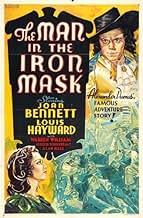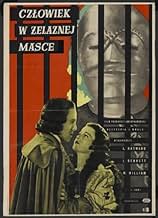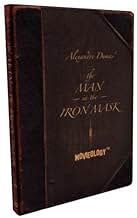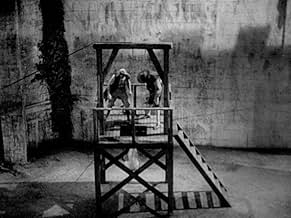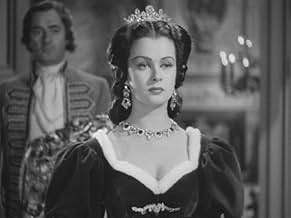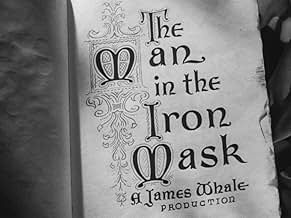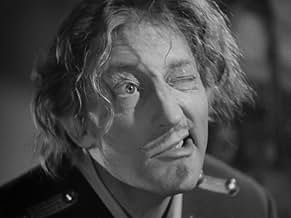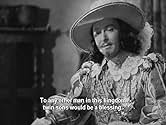AVALIAÇÃO DA IMDb
7,0/10
2,1 mil
SUA AVALIAÇÃO
Adicionar um enredo no seu idiomaDespotic King Louis XIV discovers he has a twin brother who has grown up under the tutelage of his foster father, the patriotic musketeer D'Artagnan.Despotic King Louis XIV discovers he has a twin brother who has grown up under the tutelage of his foster father, the patriotic musketeer D'Artagnan.Despotic King Louis XIV discovers he has a twin brother who has grown up under the tutelage of his foster father, the patriotic musketeer D'Artagnan.
- Direção
- Roteiristas
- Artistas
- Indicado a 1 Oscar
- 1 vitória e 1 indicação no total
Marion Martin
- Mlle. de la Valliere
- (as Marian Martin)
Nigel De Brulier
- Cardinal Richelieu
- (as Nigel de Brulier)
Reginald Barlow
- Jean Paul
- (as Reginald Barlowe)
- Direção
- Roteiristas
- Elenco e equipe completos
- Produção, bilheteria e muito mais no IMDbPro
Avaliações em destaque
James Whale, when he wasn't doing horror films which set trends, or the occasional musical, went literary with this entertaining adaptation of the famous French novel.
Old hands are involved - Warren William, Alan Hale - as part of the quartet of ageing musketeers, and do the production credit. South-African born matinée idol Louis Hayward plays both the twins admirably and pretty Joan Bennett does her usual turn which she could do in her sleep (as the princess betrothed to the bad twin and in love with the good twin).
The film veers from some very funny moments to some sweet romantic scenes between the good twin and the foreign princess, and the different characters of the twins are well portrayed. There are also a number of excellent performances in the supporting cast. With all this (and Whale's surreal imagination) you can forgive the odd lapse away from Dumas' original vision. Good stuff indeed.
Old hands are involved - Warren William, Alan Hale - as part of the quartet of ageing musketeers, and do the production credit. South-African born matinée idol Louis Hayward plays both the twins admirably and pretty Joan Bennett does her usual turn which she could do in her sleep (as the princess betrothed to the bad twin and in love with the good twin).
The film veers from some very funny moments to some sweet romantic scenes between the good twin and the foreign princess, and the different characters of the twins are well portrayed. There are also a number of excellent performances in the supporting cast. With all this (and Whale's surreal imagination) you can forgive the odd lapse away from Dumas' original vision. Good stuff indeed.
All in all, a solid film with some excellent cinematography, uniformly excellent cast and good direction (except the romantic scenes--James Whale always was a bit stiff in that department). I thought the musical score was just adequate, even though it was nominated for an Oscar that year.
Blink and you miss Albert Dekker (credited) at the opening and Peter Cushing (credited and his first screen appearance) as one of the soldiers in the scene where the soldiers first encounter the musketeers (Cushing has no lines). Dwight Frye (not credited) can be spotted as a valet about 3/4's of the way in. He has a few lines but we are so used to seeing him as "Fritz" in Whale's Frankenstein movies that he's not easy to recognize (he's a little heavier looking in this film for one thing).
Hayward was a good choice for the dual roles. A good actor, there was always something rather unpleasant at times about his looks while at other times he looked quite handsome--I think he was used to great advantage here for that reason.
Almost all the leads were independent artists, not contracted to any particular studio, so it was rather weird seeing Warners' top character man Alan Hale in this (not that they give him a whole lot to do!) I'm guessing that some footage from the 1920s version of this film with Douglas Fairbanks was incorporated into at least one scene--the king showing the newborn prince from his balcony early in the film.
After seeing this, I began to wonder if Stan Lee or Jack Kirby did not draw inspiration for their "Dr. Doom" comic book character from the iron mask shown in this film.
Blink and you miss Albert Dekker (credited) at the opening and Peter Cushing (credited and his first screen appearance) as one of the soldiers in the scene where the soldiers first encounter the musketeers (Cushing has no lines). Dwight Frye (not credited) can be spotted as a valet about 3/4's of the way in. He has a few lines but we are so used to seeing him as "Fritz" in Whale's Frankenstein movies that he's not easy to recognize (he's a little heavier looking in this film for one thing).
Hayward was a good choice for the dual roles. A good actor, there was always something rather unpleasant at times about his looks while at other times he looked quite handsome--I think he was used to great advantage here for that reason.
Almost all the leads were independent artists, not contracted to any particular studio, so it was rather weird seeing Warners' top character man Alan Hale in this (not that they give him a whole lot to do!) I'm guessing that some footage from the 1920s version of this film with Douglas Fairbanks was incorporated into at least one scene--the king showing the newborn prince from his balcony early in the film.
After seeing this, I began to wonder if Stan Lee or Jack Kirby did not draw inspiration for their "Dr. Doom" comic book character from the iron mask shown in this film.
There have been many versions over the years of the fanciful story, "The Man in the Iron Mask," the most recent one being the 1998 film starring Leonardo di Caprio. Back in the late 1970s, Richard Chamberlain took a stab at it, with highly entertaining results.
This particular version was directed to great effect by the talented James Whale, who gives us a fast, energetic, and athletic telling of the story of twins separated at birth, one who will be King of France and one who does not know that he is royalty. The twins are played by Louis Hayward, Joan Bennett is Maria Theresa, Josef Schildkraut is Fouquet, and Warren William leads the Musketeers as D'Artagnan. As one post on this board mentions, the Musketeers are getting up there in age here; Alan Hale, Miles Mander, and Bert Roach are the heroic swordsmen and friends.
It's important always that a good actor plays twins so that they have different personalities. This often is not the case. One may be mean and one may be good, but they talk the same, look the same, act the same etc. Louis Hayward does a fantastic job in his dual roles. As the arrogant King, he is foppish, cruel, dismissive and lustful. As Philip of Gascony, he is gentle and unassuming with a very different demeanor and even a different vocal timber. Hayward was a very smooth actor. It's not exactly clear what happened to his career and why he ended up in the '60s doing spaghetti westerns. Apparently this film set him up for a resume of playing twins, which he gamely did, finally becoming a very successful producer.
Although she was no match in acting for Vivien Leigh, anyone who has seen the "Gone With the Wind" screen tests knows what a beautiful Scarlett Joan Bennett would have made. She's stunning here as the confused Maria Theresa in glorious costumes, with her serene smile, porcelain skin and beautiful bone structure. Warren William, an early leading man who was the movie Perry Mason, is very likable and does well with the athletic sword fighting as D'Artagnan. Having been a leading man when talkies began, by this time he was moving into character roles. With his pencil-thin mustache, he was a familiar presence in films until his death in 1948 at the age of 54.
This is a wonderful movie, a nice remembrance of the good old Hollywood period pieces, when they really knew how to do them. Look for a young Peter Cushing as a King's messenger.
This particular version was directed to great effect by the talented James Whale, who gives us a fast, energetic, and athletic telling of the story of twins separated at birth, one who will be King of France and one who does not know that he is royalty. The twins are played by Louis Hayward, Joan Bennett is Maria Theresa, Josef Schildkraut is Fouquet, and Warren William leads the Musketeers as D'Artagnan. As one post on this board mentions, the Musketeers are getting up there in age here; Alan Hale, Miles Mander, and Bert Roach are the heroic swordsmen and friends.
It's important always that a good actor plays twins so that they have different personalities. This often is not the case. One may be mean and one may be good, but they talk the same, look the same, act the same etc. Louis Hayward does a fantastic job in his dual roles. As the arrogant King, he is foppish, cruel, dismissive and lustful. As Philip of Gascony, he is gentle and unassuming with a very different demeanor and even a different vocal timber. Hayward was a very smooth actor. It's not exactly clear what happened to his career and why he ended up in the '60s doing spaghetti westerns. Apparently this film set him up for a resume of playing twins, which he gamely did, finally becoming a very successful producer.
Although she was no match in acting for Vivien Leigh, anyone who has seen the "Gone With the Wind" screen tests knows what a beautiful Scarlett Joan Bennett would have made. She's stunning here as the confused Maria Theresa in glorious costumes, with her serene smile, porcelain skin and beautiful bone structure. Warren William, an early leading man who was the movie Perry Mason, is very likable and does well with the athletic sword fighting as D'Artagnan. Having been a leading man when talkies began, by this time he was moving into character roles. With his pencil-thin mustache, he was a familiar presence in films until his death in 1948 at the age of 54.
This is a wonderful movie, a nice remembrance of the good old Hollywood period pieces, when they really knew how to do them. Look for a young Peter Cushing as a King's messenger.
All positive comments are agreed to. This is truly one of the finest ones. The only minor dig that I could come up with is that they could have had more dueling sequences. Louis Hayward was capable of more robust fencing than what was portrayed here and I don't think they utilized his skills to any great degree. Outside of that this is a truly enjoyable film, black and white or not and while I don't advocate doing every B/W film over by colorizing it, I think I would like to see what this one Australia, What Guy Pearce Remake??????? Guy Pearce did Count of Monte Cristo, not M.I.T.I.M. as far as I have been able to determine.
Screenwriter George Bruce, a specialist with swashbuckling tales, is at his best in this rather loose adaptation of the fanciful Alexandre Dumas novel that relates how the Three Musketeers won their final battle. The scenario tells of the birth of twin sons to King Louis XIII of France and his wife, and of how, since there can be but one dauphin, the latterly born is secretly given to the care of the King's favorite swordsman D'Artagnan who, along with the Musketeers, raises him in Gascony. The return to Paris of the untitled and untravelled son, Philip, along with the four veteran warriors, at the request of Minister Colbert, one of the few who is aware of the twin birth, and the resulting adventures largely brought about by a sharp contrast in humanity between the brothers, forms the basis for the subsequent fast-moving and exciting events. Louis Hayward brilliantly plays the dual parts of the twins King Louis XIV and the unrecognized Philip, providing a proper degree of personality disparity, along with a display of excellent fencing skill and a robust penchant for romancing the Infanta of Spain, nicely performed by Joan Bennett. Walter Kingsford and Joseph Schildkraut are sterling as ministers in competition for the King's ear, as are Albert Dekker and Doris Kenyon as Louis XIII and his queen, but it is Warren William, whose profile puts that of John Barrymore to shame, who steals the supporting cast honors with a very strong performance as D'Artagnan. James Whale's flamboyant style of direction is perfect for this cinematic transposition of the classic novel, and the editing is well-nigh perfect, capping a delightful performance by all.
Você sabia?
- CuriosidadesPeter Cushing did double duty on this film. In additional to his own role, he would feed Louis Hayward the lines for the split screen shots. Director James Whale initially cast him only to play opposite Hayward in the sequences where both twins appear together, but was impressed enough with the newcomer that he offered Cushing a small part on horseback. This was Peter Cushing's film debut, and he had the unique opportunity to view the rushes and improve his own performance, especially since none of it would be used in the finished feature. As 'Second Officer,' he can be seen 17 minutes in, with two lines of dialogue: "How could I mistake it. I've been here before".
- Erros de gravaçãoIn one chase scene, a character fires a pistol three times in quick succession. 17th century firearms had to be reloaded after each shot.
- Cenas durante ou pós-créditosThe credits are printed into a old book. An unseen male hand pages through it.
- ConexõesFeatured in Peter Cushing: A One-Way Ticket to Hollywood (1989)
Principais escolhas
Faça login para avaliar e ver a lista de recomendações personalizadas
- How long is The Man in the Iron Mask?Fornecido pela Alexa
Detalhes
- Data de lançamento
- País de origem
- Idioma
- Também conhecido como
- O Máscara de Ferro
- Locações de filme
- Empresa de produção
- Consulte mais créditos da empresa na IMDbPro
- Tempo de duração1 hora 53 minutos
- Cor
- Proporção
- 1.37 : 1
Contribua para esta página
Sugerir uma alteração ou adicionar conteúdo ausente

Principal brecha
By what name was O Homem da Máscara de Ferro (1939) officially released in India in English?
Responda
